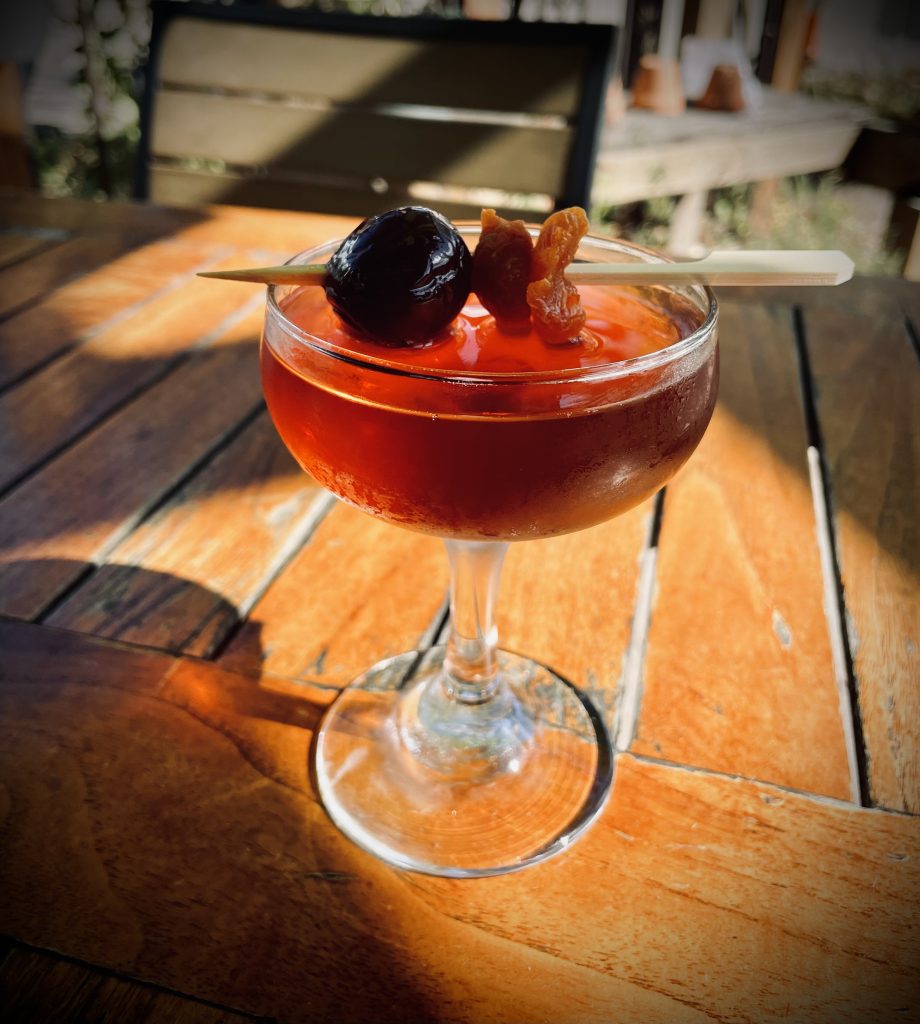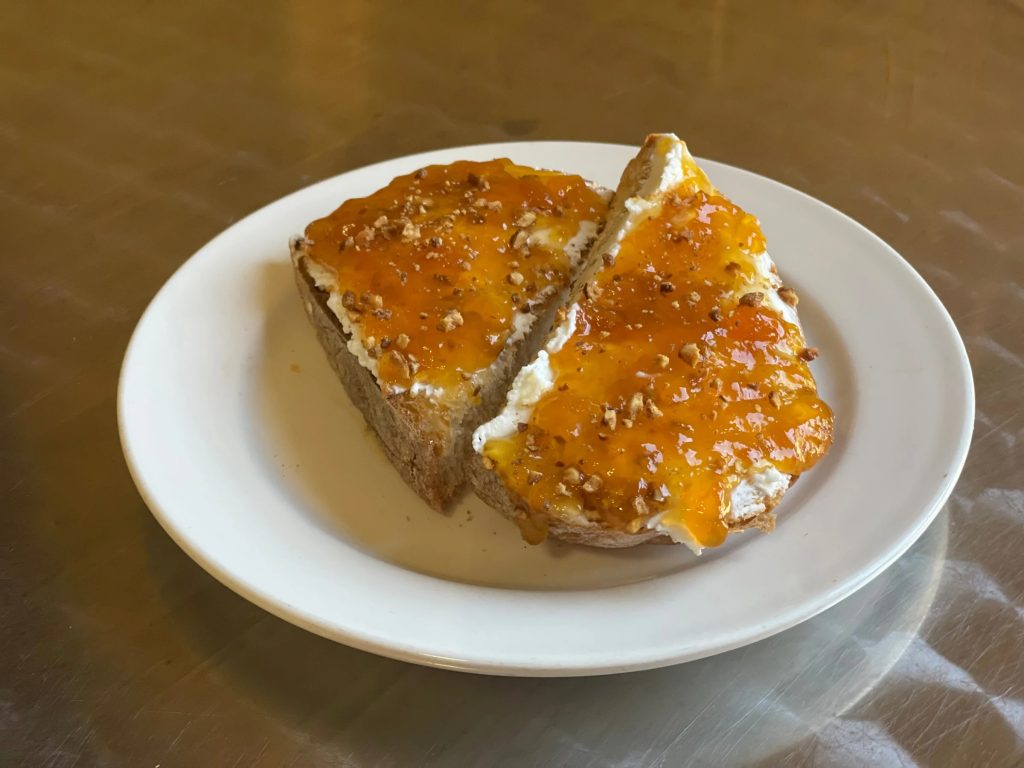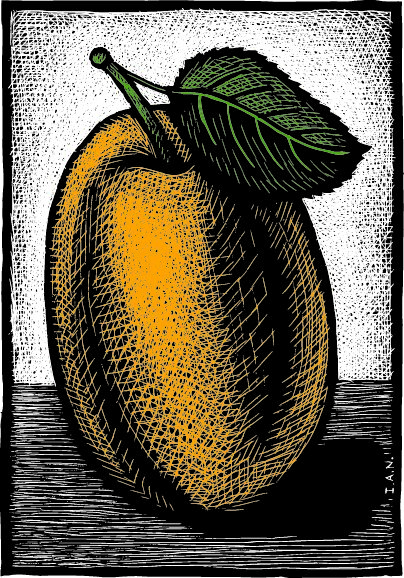The Montparnasse Manhattan

Apricot cocktails from Paris in the ’30s to the Roadhouse
What do you get when you shake up a good amount of Zingerman’s Roadhouse Bourbon (specially blended for us by Highline Spirits), some housemade dried-apricot infused vodka, the dark artichoke overtones of Cynar, and a small bit of Vya Sweet Vermouth to balance out the bitter? If you swing by the Roadhouse this month, you can find out. This cocktail is called a Montparnasse Manhattan. It features amazing flavors, a fascinating foot in history, and a symbolic but still significant connection to dignity and democracy!
The Montparnasse Manhattan is an outgrowth of a phrase I have often said to myself in recent months, “It’s a small thing, but it’s something.” It’s part of an effort to help make apricots into a meaningful symbol for dignity and democracy. As per everything I wrote above, I sometimes feel self-doubt starting to drive me into inaction, but I have managed to push forward in the belief that something meaningful would come from it. Apricot t-shirts went up online last week, and proceeds go to Democracy Now! As I wrote last week, the Anarchist Apricot Toast is on the special menu at the Coffee Company all month! And thanks to bartender Kat Franko, we have this amazing apricot cocktail on hand at the Roadhouse.
The cocktail, as is true for most of our food and drink, is rooted in history. My early research on apricots turned up the true story of the persistent and positive presence of apricot cocktails in the storied conversations of some of the 20th century’s most famous philosophers. Existentialist anti-Fascists in the 1930s had a proclivity for consuming apricot-based cocktails. In a sense, the subtitle of Sarah Blakewell’s 2016 At the Existentialist Café sums up this entire essay with a surprising succinctness: “Freedom, Being, and Apricot Cocktails.” It turns out, much to my surprise, that while autocracy was on the rise in Germany, a whole range of French philosophers—most prominently Simone de Beauvoir and Jean-Paul Sartre—were gathering in Parisian cafes and sipping, more often than not, on apricot cocktails. The headnotes for the book’s opening chapter illustrate metaphorically what I’ve been imagining in recent weeks. Creating the kind of community in which people (metaphorically, at least) “drink apricot cocktails, more people stay up late talking about freedom, and even more people change their lives.”
In the spirit of this week’s opening essay, de Beauvoir shares in the preface to her autobiography that she began writing this book when she was in her teens, really with no intention of ever finishing it or putting it into print. Forty-five years later, she finished and published it. The Prime of Life came out 60 years ago, in 1965. In it, she writes extensively about her own work, and also about her storied relationship with fellow philosphe Jean-Paul Sartre in Paris. Beginning in 1929, when de Beauvoir was only in her early 20s, the two began to spend more and more time together, enjoying life, and working out the philosophical framing that would shape their lives, with the shadow of authoritarianism on the rise in neighboring Germany. De Beauvoir writes:
We ate bread and foie gras Marie [which you can see featured in this beautiful 1931 poster by the most famous poster artist of the era, Leonetto Cappiello] in my room, or had dinner at the Brasserie Demery … we did not feel deprived of anything. In the evening, we would look in at the Falstaff or the College Inn and drink our cocktails like connoisseurs—Bronxes, Sidecars, Bacardis, Alexanders, Martinis. I had a weakness for two specialities—mead cocktails at the Vikings’ Bar, and apricot cocktails at the Bec de Gaz on the Rue Montparnasse.
The role of the apricot cocktail in their lives had only just begun, though. It became famous in the annals of philosophical history in 1932, when philosopher Raymond Aron returned from a year in Berlin studying Edmund Husserl’s phenomenological philosophy:
We spent an evening together at the Bec de Gaz in the Rue Montparnasse. We ordered the speciality of the house, apricot cocktails; Aron said, pointing to his glass, ‘You see, my dear fellow, if you are a phenomenologist, you can talk about this cocktail and make philosophy out of it!’
All these years later, we have picked up Aron’s challenge. I’m not sure the work with apricot cocktails and their symbolic connection to dignity and democracy would fully fit Raymond Aron’s phenomenological frame, but at least they’re a start. (If you’d like, you can read more about the roots of this apricotian ideology.) The cocktail tastes great. Kat Franko describes its deliciousness as:
Honeyed apricots, a little smoke, and a nice bite from the bourbon. … We’re infusing a local Ann Arbor vodka with California apricots to make cocktails akin to what was sipped by French philosophers in Paris cafes in the 1930s, adding our own chapter to history and donating one dollar from each cocktail to Democracy Now! So that democracy might spread as far as the small, sweet orange fruit we’re so obsessed with.
Swing by, sip, convene with a couple of friends, and talk about what dignity and freedom might mean. Enjoy the day and drink a toast to what matters most to you and yours.



